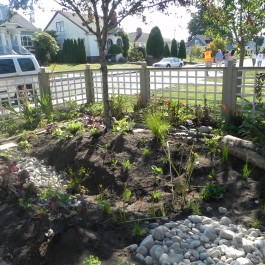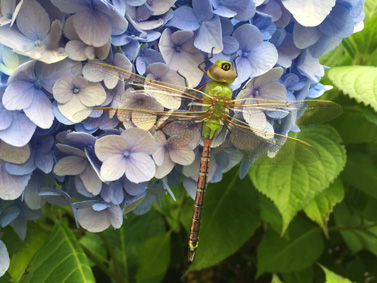When life gives you rain…plant a garden
I spent part of the day yesterday at a planting event for 7 rain gardens that were being installed along Oakes and Lombard Avenues (where over 90 homes flooded in 2010) in Everett, WA. The pilot program was sponsored by the City of Everett in partnership with the WSU extension office, The Snohomish County Conservation District, and Stewardship Partners. The installation of these rain gardens was just the beginning of an exciting goal to install 12,000 rain gardens throughout Puget Sound by 2016.
The rain garden project demonstrates how average homeowners can use innovative landscaping to help reduce water pollution and local flooding. By reducing the amount of water entering the combined sewer during large storm events the rain gardens will help to protect our local waterways from polluted runoff. Polluted runoff starts as rain that collects pollutants from urban rooftops, driveways, lawns and streets and is the largest source of water pollution
Rain gardens soak up and filter this runoff using a shallow depression in a yard planted with a variety of plants including flowers, shrubs and grasses that will tolerate wet winters and dry summers. Rain gardens mimic a forest environment to filter pollution, reduce flooding, replenish groundwater, and provide wildlife habitat to birds and pollinators.
On average, rain gardens filter 98% of all oil, grease, copper, zinc and other toxic materials before they can get into and pollute our local water ways. They are a proven and cost-effective method for addressing polluted runoff.
The homeowners received the rain gardens at no cost in exchange for signing an agreement to maintain their rain garden. I’m excited to see how these rain gardens mature and the impact they have on flooding in the area.
If you would like more information on rain gardens or this project visit: www.12000raingardens.org. If you have any questions or comments about rain garden please feel free to post them below!
Organized under Gardens, Rain Gardens. Labeled as rain garden, reduce water pollution, sustainability.





